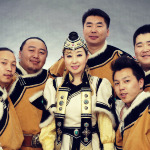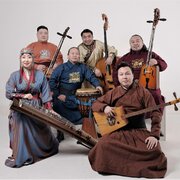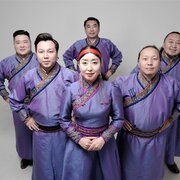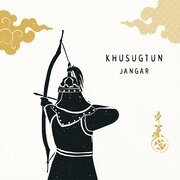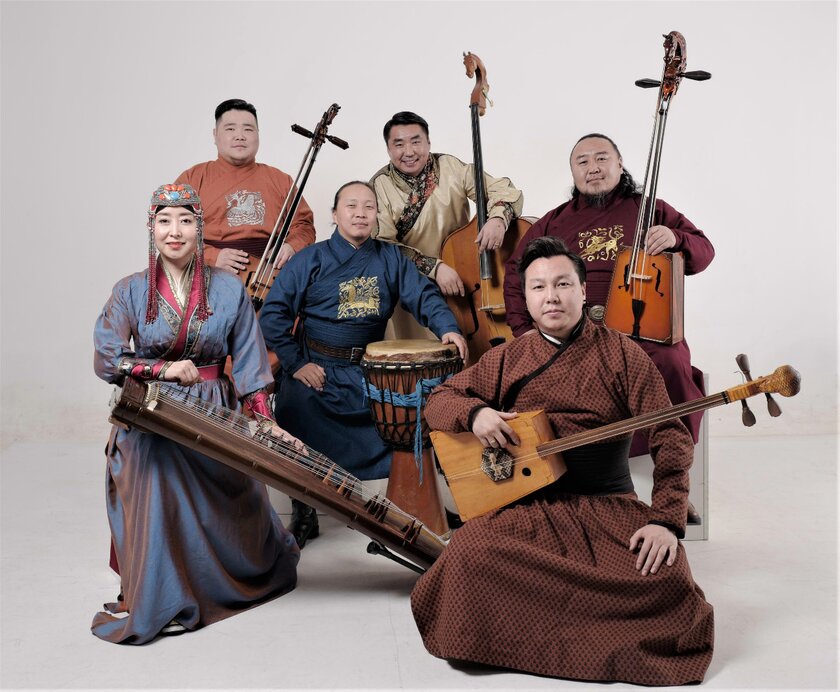
Songs
- 1 Mongol, by Khusugtun
- 2 Four Springs, by Khusugtun
- 3 Samgaldai, by Khusugtun
- 4 Chinggis Khaan, by Khusugtun
- 5 Arvan khoyor jil, by Khusugtun
- country:Mongolia
- region:Mongolia
- style(s):Polyphony, Throatsinging
- label:Buda Musique
- type:Band, Small Ensemble
- gender:male, female
- instrumentation:instrumental, vocal, a cappella, percussion, string, unplugged, lute, guitar, harp
- artist posted by:Routes Nomades
Line up
- Adiyadorj Gombosuren (Khöömii, limbe flute, djembe)
- Amarbayasgalan Chovjoo (Yatga zither, choir)
- Ariunbold Dashdorj (Khöömii, Ikh khuur, guitar)
- Batzorig Vaanchig (Khöömii, morin khuur)
- Chuluunbaatar Oyungerel (Khöömii, morin khuur)
- Ulambayar Khurelbaatar (Khöömii, dombra lute, cello)
Links
Khöömii and throat-singing in polyphony / sextet from Ulaanbaatar, Mongolia
Khusugtun is one of the hottest khöömii and throat singing groups in Mongolia for 10 years. Synonymous with "nomads", their name represents their desire to nomadize in music, like their ancestors who traveled across the world. From the beginning, the group characterized its style by melodious tunes intended to purify people from the ambient stress of the 21st century. A music destined to set people free from their daily worries, by the strong link to the nature. Thanks to an unparalleled level of interpretation, their powerful music filled with wide open spaces makes us feel good.
If Khusugtun were a picture, it would be petroglyphs … If it was a natural element, it would be a river. If that was a character, it would be Jangar, the hero of the eponymous epic.
In Mongolian “khusug” means a cart on which yurts were once placed to nomadize. Khusugtun would mean “the people of the chariots”. Intimately linked to their nomadic culture, this term is synonymous with “nomads” for these musicians who have been touring internationally for ten years. This name was chosen based on their desire to nomadize with their music, like their ancestors who traveled the world. The band, officially formed in March 2009, had so far only one self-produced album to their credit: Khusugtun. Ethnic-Ballad Group (Ulaanbaatar, 2009).
What sets Khusugtun apart is the use of vocal polyphony made from khöömii and various throat songs, as well as a repertoire almost entirely dedicated to Mongolian overtone singing (khöömii). Specific to each one, the overtone timbres complement each other wonderfully: Chulunbaatar is in the highest register (isgeree khöömii – whistled khöömii), Ariunbold, Adiyadorj and Ulambayar are in the mediums, Batzorig in the lowest register (kharkhiraa – khöömii deep). Amarbayasgalan is not overwhelming, but her soft feminine voice brings lightness to the spectrum filled with the other five, creating the necessary balance.
The group is accompanied by the fiddle horse (morin khuur), their double bass version (ikh khuur), the tovshuur lute, the dombra lute, guitar, cello, and yatga zither. There are also overtone playing instruments, such as the metal jaw harp (tömör khuur) and bamboo (khulsan khuur) as well as the musical bow (numan khuur). This instrument had fallen into oblivion and Khusugtun is bringing it up to date here. Khusugtun has chosen the djembe for percussion – an iconic instrument of World Music – to create pieces that appeal to young people, so that this generation is interested in traditional music.
Their repertoire consists of traditional forms, such as praise songs (magtaal), short songs (bogino duu), or compositions inspired by tradition, and solo instrumental pieces (tatlaga) to accompany the bii biyelgee dance.
After their association in 2009, many bands have appeared all over Mongolia and into Inner Mongolia in China, playing traditional music arranged almost identically. After being revealed by the Khöömii International Festival in Ulaanbaatar in 2009, BBC Proms in 2011, Rainforest Music Festival in 2012, and ranked 2nd at Asia’s Got Talent in 2015, Khusugtun has now gained international fame. He also became one of the influences of the phenomenon group The Hu.
References:
BBC Proms Human Planet, Royal Albert Hall 2011 ; Canada and USA tour 2017 ; NoBorder Festival 2016; Rainforest World Music Festival ; concerts in Japan, South-Korea, Brazil, Russia ; Europe tour 2022 : Musée Guimet, Le Rocher de Palmer, Opéra de Lille, Théâtre Molière-Muziekpublique (BE), Trifolion (Luxembourg), Festival Les Détours de Babel…
Discography:
-Khusugtun, Ethnic-Ballad Group (2009, self production, Ulaanbaatar)
-An Anthology of Mongolian khöömii (2017, Routes Nomades/Buda Musique)
-Jangar (2020, Routes Nomades/Buda Musique)
Press Review:
Silver Tree Award 2022 – Ministry of Culture of Mongolia
Songlines Music Awards 2021, Asie & Pacifique category
Best of Asia & Pacific 2021 - Transglobal World Music Charts Favis 2020 – Mundofonias (ESP)
Sélection albums – Le Monde
Top 15 World Music Albums – Spin The Globe (USA)
Top 25 Favorites of the Year – Global Village (USA)
Mejores álbumes de World Music de 2020 – Cuba Comunica (Cuba)


